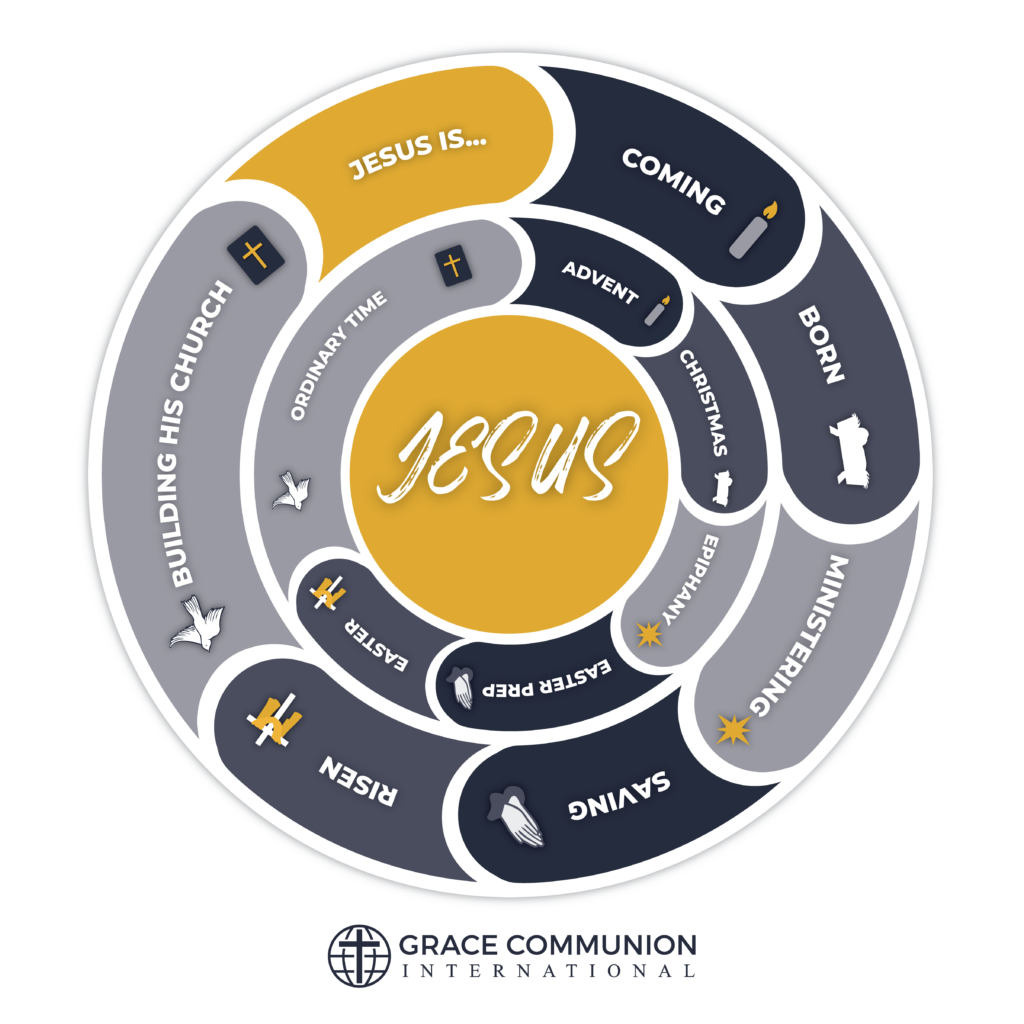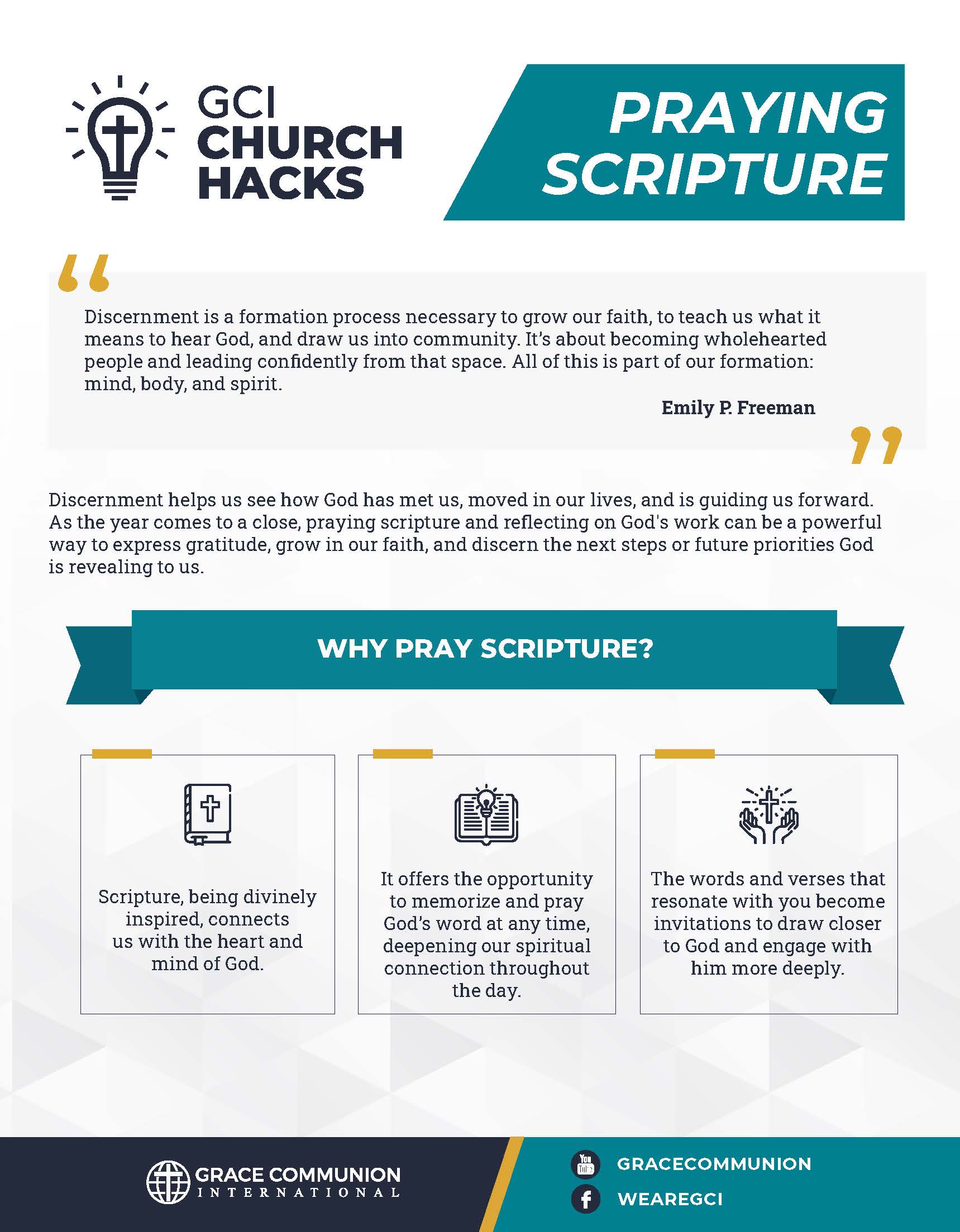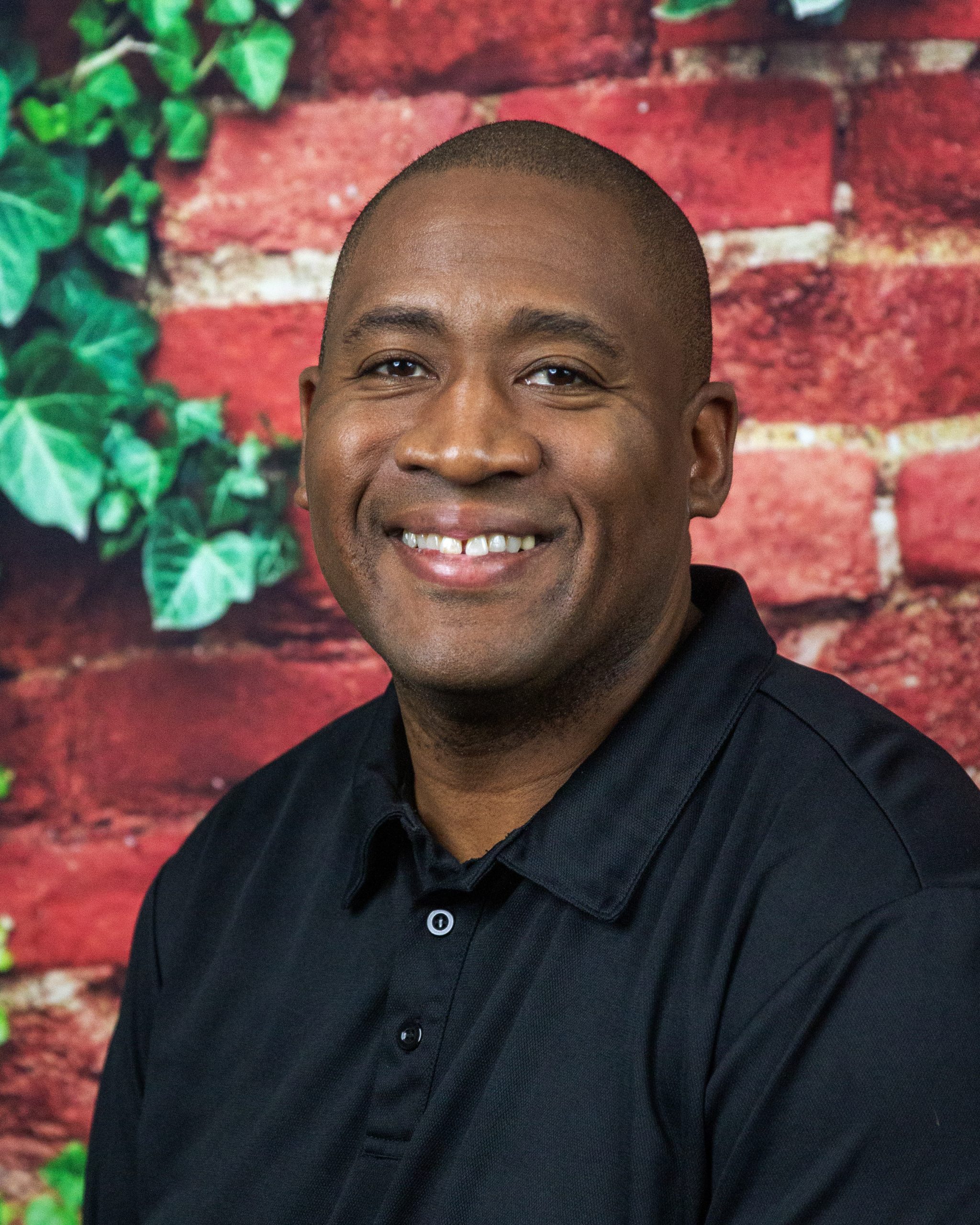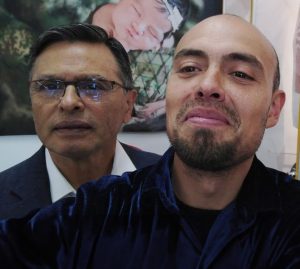Cullen Rodgers-Gates—Year C Christmas 2, Epiphany 1-3
Welcome to the Gospel Reverb podcast. Gospel Reverb is an audio gathering for preachers, teachers, and Bible thrill seekers. Each month, our host, Anthony Mullins, will interview a new guest to gain insights and preaching nuggets mined from select passages of Scripture in that month’s Revised Common Lectionary.
The podcast’s passion is to proclaim and boast in Jesus Christ, the one who reveals the heart of God, Father, Son, and Holy Spirit. And now onto the episode.
Anthony: Hello, friends, and welcome to the latest episode of Gospel Reverb. Gospel Reverb is a podcast devoted to bringing you insights from Scripture, found in the Revised Common Lectionary, and sharing commentary from a Christ centered and Trinitarian view.
I’m your host, Anthony Mullins, and it’s my delight to welcome our guest, Cullen Rogers Gates.
Since July 2020, Cullen has been serving as the director of development and membership at the National Association of Evangelicals. In this role, he established and leads the NAE’s development program while also engaging with a growing community of active members. Prior to his work at the NAE, Cullen spent 20 years in international service-learning and nonprofit leadership, including six years as executive director of Congo Initiative USA. He holds two degrees from Wheaton College: a bachelor’s degree in philosophy and a master’s degree in historical and systematic theology.
Cullen, thanks for being with us and welcome to the podcast. And since this is your first time on Gospel Reverb, we’d like to know you, man. We’d love to know about your story, your backstory and how you’re joining with Jesus in his ministry these days.
[00:01:51] Cullen: Thank you so much, Anthony. It’s a really great to be with you. I’m excited for our conversation today. And I’m honored. I’m honored to be invited on. And sure. I’ll take a few minutes to just share briefly about my story.
So, I was born in Savannah, Georgia. I actually was adopted as an infant at five days old and grew up not knowing anything about my biological family. And that’s another story for another time, which has a really incredible development that happened in the last couple of years. But when I was young, I was about two and a half, my parents made a bold decision, moved with me and my older sister over to the Middle East. And I lived for about nine years in Saudi Arabia. It was my elementary years. My dad had taken a job with Saudi Aramco oil company. My parents were also strong believers and really saw that move as an opportunity to be tentmaker missionaries, if you will, in obviously a closed country, closed to the gospel. So, my dad was working for Aramco, but they had this sense of calling, a very deep sense of calling to be representatives of Christ there. And in my growing up years, in terms of church, I was part of an interdenominational fellowship there.
So, there was one service a week for Protestants, one for Catholics and one for Eastern Orthodox. And that was it. So, lots of different denominations were represented.
And I grew up in this environment where both kind of ecclesially, it was normal to interact with people from other denominational backgrounds or non-denominational backgrounds, but then culturally more broadly living in. It was a very international community. So, in addition to Saudis that lived with us, there were other Americans, people from Asia, people from Europe, and even other parts of the Middle East. And God really used that time in my life really to establish a foundation for the rest of my life, which was about engagement with people from other various walks of life and other cultures.
And one of the things that I’ve realized looking back on that time is that one, what God did during that time was to really instill within me a love for building bridges between people. And that has become a part of my kind of identity as a bridge-builder. We moved back to the U.S. for my middle school and high school years, I lived in Augusta, Georgia, and during that time continued to grow in my faith.
I had come to faith quite young, seven years old. But really in middle school was when that really became something that I was passionate about and started to get serious about. I had the opportunity to participate in some mission trips. And so, building on the foundation of having lived overseas and then doing these mission trips as a teenager, God used that to just further develop and further hone my vision for my life as being a bridge-builder.
And then more particularly thinking more and more about missions as a vocation. I went to Wheaton College, and Wheaton was a really transformational time in my life. Partly because that’s where I met my future wife, Mandy. She was one year ahead of me. She’s from Northwest Indiana. We met there at Wheaton.
But also at Wheaton, I had the opportunity to participate in a unique service-learning study abroad kind of program called the Human Needs and Global Resources program. We called it “hunger” for short — H.N.G.R. And if you were to take the Peace Corps kind of experience and repackage that into the context of a Christian College curriculum, that’s what “hunger” was. So, we took a variety of classes that were exposing us to the realities and challenges of poverty, hunger, injustice in particularly what we would call the developing world or the global south. So Latin America, Africa, and Asia predominantly, but looking at those issues through the lens of a Christian, from a Christian perspective.
And then the highlight of the program was you would go and live for six months in a developing world context, totally immersed there. Live with a local family, participate with a local organization, and even do field-based research for which you would earn credit back at Wheaton. This was an academic certificate program.
And so that experience, both Mandy and I participated in that, and that experience had a really profound impact on my life. After Wheaton, I had the opportunity to work with refugees with World Relief in the Chicago suburbs and did that for a little over a year. Absolutely loved that. And then God opened a door for me to return to Wheaton as a staff member as the assistant director of this program, the “hunger” program.
And so, then for the next seven years, I had the privilege of walking alongside Wheaton students as they prepared for their internships. And we sent them out and then we brought them back and got to do a lot of mentoring with the students. And then also I had the privilege of traveling around the world to develop partnerships on behalf of our program with all these amazing organizations that we would send our students to.
In 2008, God called us to North Carolina where we currently live here in Durham, North Carolina. Mandy did theological education at Duke Divinity School. And when we made that transition, then I moved into working with an organization called Congo Initiative. And I was with Congo Initiative for 12 years before then joining the National Association of Evangelicals a little over four years ago.
And yeah, we have three kids, Hannah, Ethan, and Caleb. They are young adults at this point. And that’s a little bit about, yeah, it’s a little bit about who I am, who we are.
[00:09:02] Anthony: You’ve had extensive experience, and by the way, congratulation on remembering the names of your kids. That’s always important.
And this may be the most important question that I ask you since you started your life in Savannah, did you meet Forrest Gump? Did you bridge-build there?
[00:09:22] Cullen: No. Unfortunately, I didn’t have that opportunity, Anthony, but that would have been, that would have been amazing.
[00:09:29] Anthony: I did know part of your backstory about the adoption, and I was just thinking about the gospel texts we’re going to read in Ephesians 1 that talks about our adoption as the children of God. So, I’m sure that that text has life for you in a way that it maybe it doesn’t for some of us.
So, I’m thankful for that experience you had and the experience that you had in international nonprofit leadership. And I wanted to ask you about this. I can only imagine you’ve experienced God’s goodness in the plight of others as throughout your travels. And though Gospel Reverb has a global podcast audience, many of our listeners are based right here in the good ole U.S. of A.
So, my question is this: what can the American church learn and should be curious about from our brothers and sisters in Christ abroad?
[00:10:23] Cullen: Wow. So, Anthony, you said we have about five hours for this podcast, right? So much to learn, right? Yeah, absolutely. This is really, it’s really a privilege to even be asked this question.
This is great timing because I’ve just recently returned about a month ago. I had the privilege of returning to the Democratic Republic of Congo with a small delegation from my church here in Durham. We have a long-standing partnership with the organization I used to serve with, Congo initiative. It’s based in Eastern DRC, and I had the privilege of introducing my church about 12, 13 years ago to the ministry during my early years of working with the organization.
And so, I went with my pastor and his wife just a month ago. At the center of the ministry is a Christian bilingual university. And then there’s some other community development, community empowerment programs that sort of flow out of that, but the university is really the hub of the work there.
And they were celebrating — they’ve just celebrated their one-thousandth graduate in the history of the school. So, the school started in 2007, so it’s about 17 years old. And they were having their graduation ceremony. And then they also in conjunction with that, because of this amazing milestone of reaching a thousand total graduates, they also held their first ever homecoming celebration. And you have to understand homecoming is a completely foreign concept in Congolese education. To us, we’re used to it here in the U.S., but it’s completely foreign there. And so, it was a really big deal.
So, it was a multi-day experience between the homecoming and the graduation. And it was just a profound experience for me, both on a personal level, just to reconnect with that ministry. It had probably been five or six years since I had been in Congo last. And so, it was a really amazing experience on a personal level. But also, to your question, it was powerful to, once again, be with God’s people in that context. And I should also note that we’re talking about the Eastern part of Congo.
So, this ministry is based in the city of Beni, which is only about 50 miles west of the Uganda border. So, it’s in the far Eastern side of the country. And if you know anything about Eastern Congo, or if you’ve heard anything about Eastern Congo, you’ll probably immediately think of minerals and conflict.
And that is exactly what’s happening even still to this day. There’s ongoing insecurity for the past 20, 25 years in that region. And yet there’s this amazing work of God that’s happening. And so, it was a privilege to be back there. And I think to answer your question, Anthony, there’s three things that I would say that the American church can learn, and there’s surely much more.
But one of those is the centrality of community for how we understand what Christian discipleship is, the importance of community, walking together with brothers and sisters, and that relationships matter a lot. That we are not on our Christian journey. This is not an isolated, it’s personal. Our faith is personal, but it’s not isolated and private in the sense that we are just doing this by ourselves. And being back in Congo and being with brothers and sisters there reminded me powerfully of that.
Another thing is that we serve a God who is bigger than we imagine, and He can handle all of our experiences and emotions together at the same time. One of the things I was struck by was how the folks we were with in Congo, they’ve all experienced trauma and suffering in one way or another. It’s really hard to find someone in that part of Congo who hasn’t lost at least one loved one or more to the violence that’s been going on and there. So, there’s this deep pain and trauma that’s there. And yet their capacity to enter into our times of worship in such an unfettered and uninhibited way was just such a witness to me. And the thing is that we were blessed both with these large gatherings that there was a lot of worship with just so much singing, so much dancing, so much joy.
And also, we had the opportunity to visit with different people in their homes for much more intimate times of extended conversation, hearing more of their backstories. And as they shared those stories, they did not shy away from the painful parts. They talked about the pain. They talked about the loneliness that they experienced and even the doubts that they had about God and about faith.
They shared all of that. They were so vulnerable with us, which was such a gift. And so, it’s not that they were masking the hard parts of their lives when they were worshiping and there was so much joy, they were honest about those. And yet they also, somehow by God’s grace through the power of the Spirit, I believe we’re enabled to enter fully into the joy of the Lord.
And to me, it was a testimony that we can lament. We can both lament the brokenness of our lives and the brokenness of this world and praise God with vigor and joy, absolute joy! And that one of those realities does not diminish the significance of the other, and ultimately, we can do this because this is the kind of God we serve who can hold all that together.
And then I think the last thing I would mention here, Anthony, is that just a reminder of how utterly dependent we are on God’s grace and mercy. You know we often don’t feel that need here in the West, right? It’s harder for us to feel in a visceral way that need because we’re blessed with so many material comforts. And many of us, particularly those of us who come from majority white culture of privilege, socioeconomic stability, we’re insulated by so many of the hardships of life.
And yet the church throughout the global South, the developing world in particular, is much more familiar with suffering and hardship. And in the case of Congo, the insecurity and the anxiety from that ongoing conflict in that part of the world. And so, I was just reminded afresh as I watched, listened, rejoiced, and celebrated with these brothers and sisters.
They witnessed to me of that utter dependence on God. And it was a reminder that even if I can mask on a day-to-day basis my needs, that doesn’t change the reality that I too, just as they are, I too am utterly dependent on God’s grace and mercy. So those are a few things that I take away.
[00:19:02] Anthony: There was so much said there. Thank you. I couldn’t help but think I’d love to have you back for a separate podcast just to talk about these issues because what you said was profound, and several things came to my mind. Number one, and we’ll talk about humility later in one of the pericopes we’re looking at, but how we must embrace and embody Christ’s humility to learn from one another because it’s so easy to think that we’re coming in to help others to be the hope to others. Whereas there’s so much to learn and gain, to receive from our brothers and sisters. And I’m reminded of that passage about “doing this unto the least of these,” while I’m one of the least of these. And if I don’t see myself that way, I’ll lose sight of that.
And I certainly appreciated what you said about lament and joy. I’ve heard it said that lament and hope are twin sisters, walking hand in hand down the road. And it is okay because if you read the Psalms, you can’t escape the lament, right? It is there. Ecclesiastes laments. God is big enough to hold that. And also, we see that the joy of the Lord is our strength, even in the face of great adversity.
So, I just, I so appreciated what you said, and it’s going to tie in so well with the rich passages, these gospel texts we’re going to look at today.
[00:20:33] Anthony: So, let’s go ahead and transition to our first pericope of the month. It’s Ephesians 1:3-14. I’m going to be reading from the New Revised Standard Version, the Updated Edition (NRSVUE). It is a Revised Common Lectionary passage for the second Sunday after Christmas on January 5.
Blessed be the God and Father of our Lord Jesus Christ, who has blessed us in Christ with every spiritual blessing in the heavenly places, 4 just as he chose us in Christ before the foundation of the world to be holy and blameless before him in love. 5 He destined us for adoption as his children through Jesus Christ, according to the good pleasure of his will, 6 to the praise of his glorious grace that he freely bestowed on us in the Beloved. 7 In him we have redemption through his blood, the forgiveness of our trespasses, according to the riches of his grace 8 that he lavished on us. With all wisdom and insight 9 he has made known to us the mystery of his will, according to his good pleasure that he set forth in Christ, 10 as a plan for the fullness of time, to gather up all things in him, things in heaven and things on earth. 11 In Christ we have also obtained an inheritance, having been destined according to the purpose of him who accomplishes all things according to his counsel and will, 12 so that we, who were the first to set our hope on Christ, might live for the praise of his glory. 13 In him you also, when you had heard the word of truth, the gospel of your salvation, and had believed in him, were marked with the seal of the promised Holy Spirit; 14 this is the pledge of our inheritance toward redemption as God’s own people, to the praise of his glory.
That’s an awesome gospel text. So, Cullen, if you were preaching this gospel text to the congregation where you worship, what would be the focus of your gospel proclamation?
[00:22:42] Cullen: I think Anthony, I’m struck by this passage. I know it comes from an epistle, it’s a letter. And so, I guess it’s prose, but it definitely sounds like poetry to me. It certainly sounds like a hymn.
[00:23:01] Anthony: Yes. A song.
[00:23:09] Cullen: It is just hearing you read it again, is just an overwhelming flood. the first thing that I’m struck with is God’s grace in all of this, and the language Paul uses. He uses different words to emphasize just how over the top is this love of God that knows no bounds. This language of “every” — we’ve been blessed with every spiritual blessing.
The idea that we are chosen by Him. Someone once said, I don’t remember who it was, that God is rich in mercy and He’s a big spender. And that’s always stuck with me. I think I would, if I were preaching this, I would really focus on the overwhelming all-sufficiency of God’s grace in our lives.
That we have been so utterly blessed and equipped by God in Jesus that we have no need to turn to any other person or thing or aspiration where we might find our ultimate purpose. That God’s grace and blessing is so all-sufficient that everything we need for life and for purpose and meaning is found in Him.
It makes me think of, I think it was Peter, in John 6, he says, “Lord, to whom shall we go? You alone have the words of eternal life.” And that’s the sense that I get from this passage.
I think another motif here is the inheritance that we have in Christ. And you see the word “destined,” which appears a couple of times. I love that language because it reminds us that our purpose didn’t start with our birth, but our purpose, our destiny, if you will, to use that language, really started long before the foundations of the world.
I think another thing that stands out to me here is that God’s revelation itself is a gift of grace. And that’s a prominent feature in this passage. We see this language of “mystery” throughout Paul’s letters, the mystery of the gospel. And it’s mystery because it had to be revealed to us.
And we were utterly dependent that God would reveal Himself to us in the way He has through Christ. And this really underscores what we would call special revelation. We have special revelation of God in Christ. That’s distinct from general revelation, to all that God makes available to all humanity.
Anthony, I was remembering as I was reflecting on this years ago, I had the opportunity to sit in a class, Old Testament theology class at Wheaton. And I remember being for the first time, my paradigm of the Old Testament, particularly when we think about the law, the giving of the law in the form of the Ten Commandments.
And growing up in Reformed tradition I understood this sort of distinction between law and grace. And it can be really easy to take that, interpret that in ways that actually are not faithful to Scripture in such that you, if you take it to an extreme, you can get to a place where you are understanding the God of Scripture to be almost two different gods.
And I think it was at Marcion, the heretic Marcion, who actually promoted that belief that the God of the old Testament, the God of law and the Ten Commandments, that God is somehow different from the God of the New Testament that we meet in Jesus, the God of mercy and love and forgiveness.
And of course that is not what we believe. We believe all of Scripture points to the triune God. And as Christians we can understand, we can read the Old Testament through a Christo-centric lens recognizing that Christ’s life, death, and resurrection is the interpretive framework for the entire Scripture.
And the professor in my Old Testament class was talking about how radical it was that the people of Israel had been given Ten Commandments. We in the West — particularly in traditions where we are trying to separate ourselves from a legalistic or fundamentalist orientation to the faith that is rules-based, and we’re trying to emphasize the mercy and the grace of God over against the legalism — it’s easy for us — I’ll speak for myself. It’s easy for me sometimes to look at the Ten Commandments a bit askance to be a little bit suspicious. It’s not about works. It’s about we’re saved by grace through faith alone.
Yes, that’s true. But my professor was helping me to recapture the radical nature of God’s grace in giving the Ten Commandments in the first place. And we looked at these prayers and passages from other Israel’s neighboring nations. And the various gods that they worshiped. And you read these texts, these prayers of these other nations to their gods that are basically unknown gods.
And when you read them, there’s this sense of anxiety and foreboding in their prayers because what’s actually happening is they don’t know what those gods require of them. And it’s the not-knowing, it’s the far off and distant God, the inscrutable God that they’re hoping to appease with sacrifices or whatever else they’re doing, that there’s an anxiety there. Because they don’t know how do I satisfy this God’s demands. I don’t even know what’s expected. And so just an incredible anxiety.
And so, when God comes to the people of Israel and, through Moses, gives them the Ten Commandments, He’s showing them, this is grace that I’m showing you the way how you are to be my people. And that clarity, that insight, that revelation is really quite radical. And ultimately, it points back to His grace.
And then I love in verse, I think it’s verse 10 of this passage says, “as a plan for the fullness of time, to gather up all things in him, things in heaven and things on earth.” And Anthony, that makes me think of Colossians 1:20, one of my favorite passages in Scripture, which says, “through Christ, God was pleased to reconcile to Himself all things, whether on earth or in heaven by making peace through the blood of His cross.” And so, it’s that comprehensive gospel. So yeah.
[00:31:14] Anthony: Yeah. You talked about God’s revelation being grace, and it was grace all along. God is not schizophrenic. He’s not of two minds. He was revealing Himself and His goodness, and it all gets wrapped up and summed up in Christ, right?
That’s why the writer of Hebrews would say, “in the past He spoke through the prophets, but now He speak and has spoken through His Son,” not in pieces, but the full comprehensive revelation of the goodness of God. This is who God is, and this is who God has always been, and this is why this hymn, this poetry that you referred to in Ephesians 1 is so beautiful because Paul is just, it’s almost like he can’t contain himself.
There’s so much good to talk about this goodness of God revealed in Jesus Christ. And this prompts us, this love of God, it compels us to live a certain way. In verse 12 says, “that we might live for the praise of His glory for those who set their hope on Christ.” Maybe give us some insights, Cullen, on what it might look like to live in such a way.
[00:32:27] Cullen: Yeah, I think the first thing that comes to mind is joy. Scripture says that the joy of the Lord is our strength and thinking again about my recent time in Congo, as I was sharing earlier. And I was just witness to a powerful display of joy. And so, living for the praise of His glory.
That’s one of the things I think is that we live in such a way that where, when we really begin to understand how much God has lavished on us — and you’re exactly right in this passage. It’s as if Paul, he just can’t contain himself, and he can’t find enough words and enough superlatives to describe the God that we follow, the God we serve.
And so, there’s a joy when we really begin to let the truth of who this God is and the way He’s lavished His grace and mercy on us who are so undeserving, right? When we really let that settle into our bones, if you will, how can we not begin to walk forth with joy that is, again, not a surface level, oh, everything’s fine, but a deep sense of purpose and meaning and recognition of how much God has done for us in Christ.
I think also living for the praise of His glory means that our works, our actions, the way we live really does matter. And there’s a couple things that I would highlight. One is, you mentioned this earlier, the role of humility. It’s His glory, the praise of His glory that we’re living for, not our own.
And so there has to be at the root of this a humility that governs our entire lives. I also think with that humility, there’s a boldness, right? There’s a boldness in knowing, trusting, believing absolutely with every fiber our beings that God is who He says He is and that he has in fact accomplished everything in Christ.
There should be an eagerness. We should live in a way where we are eager to point others to Christ as the source of our hope. So, there’s both a humility — and I think we’ll talk about this a little bit more coming up in a few minutes — of a pointing, pointing others away from us, pointing to God. There’s a humility and a boldness there.
One of my favorites passages in Scripture, Anthony, is the verses that immediately followed the hymn in Philippians 2. Those first 11 verses that talk about Christ’s humiliation that he was obedient to death and even death on a cross and then went all the way down to hell itself and then was raised back up to be seated at the right hand of God, the Father, so that the hymn of Christ’s humiliation and then exaltation.
And then immediately after that it says, “Therefore, work out your salvation with fear and trembling for it is God who is at work in us.” And that’s just such an amazing call to us to work out our salvation. And so, I think that’s another way in which we live for the praise of His glory is that command to us is in the context of Christ’s humiliation and exaltation. And it’s all based on what he’s done that we can then go forth and live out our salvation, knowing that it’s actually God who is at work in us.
Think of Ephesians 2:10: we are God’s workmanship created for God’s works, which He prepared beforehand. And I love that verse for lots of reasons. One of them is that again our calling as believers didn’t begin with our physical birth, but God had actually prepared these works for us to do before we came into existence, which is just an incredible vision. And there’s other things I could say there, but I’ll stop there and see how you might want to respond to that.
[00:37:26] Anthony: I’m struck by the paradoxical nature of the Christian life because it looks like humility and boldness would be on opposite ends of the spectrum, but they’re held together in Christ that both are true.
Christ was the one who washed the feet of his disciples, of his friends. And yet he was within just a few hours, the one who boldly submitted to the love of the Father and died for humanity. It’s just — you’re right, they go hand in hand. And yeah, that’s a good word to wrap up that particular passage of Scripture with. Thank you.
[00:38:07] Anthony: Let’s transition to the next pericope of the month. It’s Luke 3:15-17, 21-22. It is a Revised Common Lectionary passage for Baptism of our Lord on January 12. Cullen, would you read it for us, please?
[00:38:23] Cullen: Absolutely.
As the people were filled with expectation and all were questioning in their hearts concerning John, whether he might be the Messiah, 16 John answered all of them by saying, “I baptize you with water, but one who is more powerful than I is coming; I am not worthy to untie the strap of his sandals. He will baptize you with the Holy Spirit and fire. 17 His winnowing fork is in his hand to clear his threshing floor and to gather the wheat into his granary, but the chaff he will burn with unquenchable fire.”
Now when all the people were baptized and when Jesus also had been baptized and was praying, the heaven was opened, 22 and the Holy Spirit descended upon him in bodily form like a dove. And a voice came from heaven, “You are my Son, the Beloved; with you I am well pleased.”
[00:39:26] Anthony: Once again, I was struck by John’s humility, as we’ve been discussing, and his accurate self-awareness that, you know what, I’m not the center of the story, but it’s Jesus who would come after him. And if we can imagine headlines in a newspaper, it’d be easy for him to be seduced by that. Is John the Baptist, the real Messiah? But he wasn’t.
So, what can pastors, ministry leaders, believers learn from John in this text?
[00:39:54] Cullen: John had a clear understanding of his identity and his purpose. He recognized his role. He was faithful to fulfill that role as being distinct from the Messiah. And I think back to the passage just before, when we talked about living to the praise of God’s glory, and John was a model of that in his earthly life and in his vocation.
So, there’s two different baptisms here. One is the water baptism representing our death to self-rising to new life in Christ. And then John speaks here in the passage about the baptism that the Messiah will bring is a different kind of baptism one of the Holy Spirit and fire.
And of course, we understand what that’s pointing to in terms of Pentecost and the incredible outpouring of the Holy Spirit at that point after Jesus ascended. But that baptism that Jesus is bringing follows from our water baptism, which reflects our death and then being raised again as part of God’s new creation.
And so, I would say our ministry, as pastors and leaders consider this passage, it’s about pointing people to Jesus, not to ourselves. And I would say to the extent that people look to pastors and leaders as spiritual guides, as exemplars. Our purpose really is to direct their gaze to the one who makes us holy.
Sometimes we see people of faith, pastors, and other leaders, spiritual leaders as being — we’ll say so and so is super spiritual, and we can so easily get caught up in other humans who we might put on a pedestal for one reason or another. But I think when we think about what actually makes us holy, it’s not our own works, right?
1 Peter 2:9 says, “but you are a chosen people, a royal priesthood, a holy nation, God’s own people.” At the beginning of this letter, Peter says that we’ve been chosen and destined by God, the Father, sanctified by the Spirit to be obedient to the Son. And so, this work of sanctification is something that has been done for us and in us.
And it’s a clear recognition that whatever holiness we have is ultimately actually a gift of grace from the One who has made us holy. And so, I think this is just helps to reinforce that our calling is to point people to Jesus.
2 Corinthians 5. I just love that chapter. It’s so rich in terms of a paradigm for what it means to live the Christian life. And it talks about how we are representatives and ambassadors of God, ambassadors of the kingdom. We are ambassadors for Christ since God is making His appeal through us. That’s 2 Corinthians 5:20. And so really the ultimate goal is that we are being formed into the image of Jesus Christ, right?
So, any imitation of leaders here on earth should really be with that end in mind, that it’s about being formed, being made into the image of Christ.
[00:43:56] Anthony: And I can’t help but think of John 1, this same John, the baptizer, has his followers, and they’re listening to him and Jesus walks by and immediately, without hesitation, Scripture points us to John pointing away from himself and saying, “Look, the lamb of God who takes away the sins of the world.” And the followers get up to follow Jesus. And that’s the way it should be instead of trying to hold these people as my followers. They’re being formed in the image of Christ, not me and not you. And we would do well to follow John’s example, would we not, in pointing away from ourselves to Jesus?
And as we do that, we still looked at Jesus. We’re going to celebrate on this day, the baptism of our Lord. And I’m just curious from your perspective why was the perfect One baptized and why is it good news for us?
[00:44:58] Cullen: Yeah, that’s a great question and just wanted to say to your point there a minute ago, Anthony, amen to the pointing people to the Lamb of God.
So yeah, Jesus baptism. It is a curious thing, right? And the much smarter people than me have written much more than I have about this. But there’s a couple things that as I reflect on this that I think are significant. Yeah. One is that Jesus’ baptism in a way reflects His complete identification with the human condition, with human beings, taking on human flesh with all of its limitations and making Himself subject to the lived experience of humanity, including temptation of various sorts.
I think the baptism of Jesus also represents His utter dependence on God the Father and on our behalf. And then what immediately follows in this passage after His baptism, God speaks over Him. “You are my Son, the beloved. With you, I am well pleased.” I think the posture and practice of submission to God prepares us to receive the unconditional love of God in a way that grounds us in our true identity as beloved children.
And for me, Jesus baptism exemplifies this, but it’s more than just a metaphorical paradigm for us to emulate: look, Jesus got baptized, and so now we should be baptized. I think it maybe more importantly shows us how completely — and this goes back to the point I made just a moment ago — just how completely Jesus entered into the human identity, expressing absolute, total solidarity with each of us human beings in His reliance on God’s love and mercy and the incarnation. This is what grounds the incarnation and the mystery that Jesus was fully God and fully man. And our redemption is complete because of this reality. The early church fathers emphasized how critical this is.
I think it was Gregory of Nazianzus who said, “What has not been assumed has not been healed.” It is what is united to God’s divinity that is saved. And so that is just such a powerful summation of why the Incarnation matters. And it matters because God has come to redeem and to heal the entirety of human life and experience.
And I just think what tremendously good news this is for us.
[00:48:11] Anthony: Amen and amen. And thank you, Lord Jesus, that You did assume our fallen, sin sick humanity into Yourself to heal it, not only as the great physician, but You became the patient. You became one of us and took it upon Yourself. We praise You.
And I always loved hearing Gregory Nazianzus quoted because he was known even among his peers as the theologian, not just a theologian; he was a teacher of teachers in his day.
[00:48:50] Anthony: Let’s pivot to our next passage. It’s 1 Corinthians 12:1-11. It is a Revised Common Lectionary passage for the second Sunday after Epiphany on January 19.
Now concerning spiritual gifts, brothers and sisters, I do not want you to be ignorant. 2 You know that when you were gentiles you were enticed and led astray to idols that could not speak. 3 Therefore I want you to understand that no one speaking by the Spirit of God ever says, “Let Jesus be cursed!” and no one can say “Jesus is Lord” except by the Holy Spirit. 4 Now there are varieties of gifts but the same Spirit, 5 and there are varieties of services but the same Lord, 6 and there are varieties of activities, but it is the same God who activates all of them in everyone. 7 To each is given the manifestation of the Spirit for the common good. 8 To one is given through the Spirit the utterance of wisdom and to another the utterance of knowledge according to the same Spirit, 9 to another faith by the same Spirit, to another gifts of healing by the one Spirit, 10 to another the working of powerful deeds, to another prophecy, to another the discernment of spirits, to another various kinds of tongues, to another the interpretation of tongues. 11 All these are activated by one and the same Spirit, who allots to each one individually just as the Spirit chooses.
Cullen, “to each is given the manifestation of the Spirit for the common good,” verse 7, which reminds me of what you said about the Congolese people, just the high view of community, the need for community for the common good. But we live, especially in the West, in a “me” society where consumerism mindset is rampant, but we believers have been called to share what the Spirit has given to us for the sake of others, the common good.
Will you tell us more, please?
[00:50:49] Cullen: I’m drawn immediately as I think about this passage to Jesus’ words in Matthew 16, where he says, “Whoever loses their life for my sake, will find it.”
[00:50:59] Anthony: Yes.
[00:51:00] Cullen: The way of Christ, Anthony, is the way of self-sacrifice, and it’s the way of surrender. As you said just a moment ago, we live in a culture that urges us to, quote, fight for our rights, right?
Jesus’ call to us, upon us, is diametrically opposed to this. He calls us to be prepared not to fight for our rights, but to lay down our lives and not only for the people that we like and love, our friends, but even for our enemies, because of course He paid the ultimate price and none of us were His friends, right?
Scripture reminds us that we were, while we were yet sinners, while we were at enmity with God that He laid down His life and that He redeemed us.
And I do want to just make a quick caveat here, Anthony. I think it’s important to clarify that I’m not talking when I critique the fight for our rights, I’m not talking about working for justice particularly on behalf of the poor and the vulnerable in our society. That actually is, I believe, an integral part of our gospel witness. That is the way of Jesus. As He announced His ministry in Luke 4, when He quoted from the prophet Isaiah, and He talked about sight for the blind and release for the captive. Those kinds of things are part of a holistic gospel witness.
But rather, we’re talking here about how we as believers are to live in a way that our gifts and talents, our whole selves, can be poured out for the upbuilding of the body of Christ.
I think this passage also helps us to pay close attention to how the Spirit is at work since the Spirit is the One that has mediated distinct gifts to every believer, And so if we really take that seriously, what it does is it enhances our dependence on one another as fellow believers. And it helps us recognize that our calling is not to live, and I referenced this earlier, it’s not to live in isolation as individual followers of Jesus only, but to lean into the community, our community of faith as members of a family, even more vital members of a body whose corporate witness of unity is the primary way that the world will come to know God.
In John 17, we read that the unity that we have with one another in Christ is itself the way that people will come to know the love of God. In the West, in particular, we’ve read so much of the Bible through an individualist lens, but much of it was actually written to and for a corporate audience as the gathered people of God, hearing the word together, right?
This is one of the many reasons why corporate worship is absolutely central to our life with God. Worship’s not just a glorified quiet time. It’s actually participation with the gathered people of God in praise of the triune God. And that’s something that can’t be replicated on an individual scale.
So, I love how Paul talks in this passage about the way that the Spirit gives gifts to different believers. I just love that. Talk about the dignity of our calling as believers that we’ve been carefully selected for this or that gift by the Holy Spirit, and that He’s done that in such a way that we will then also rely upon one another because none of us has the whole picture, right?
We need each other. We need to share these gifts so that together, perhaps in some feeble, imperfect way, the fabric of these gifts, woven together, will be a powerful witness to the world.
[00:55:33] Anthony: By my count Cullen, the Holy Spirit is mentioned 10 times in this passage. And we know the Spirit is leading us into all truth as Scripture reveals to us.
So, what truth about God is being revealed by the Spirit through this passage?
[00:55:48] Cullen: What stands out to me is the diversity of gifts and the breadth of the Spirit’s activity. The reference to the common good in verse 7 reflects a holistic and comprehensive picture of Spirit-empowered witness to God’s new creation.
One of my favorite Christmas hymns is “Joy to the World.” And I love the third verse where it says, “He comes to make His blessings known far as the curse is found.” If you think about that, it’s just such a compelling way to talk about God’s redemptive work, “far as the curse is found.” We know that the curse is found everywhere, right?
So, wherever we find sins effects there, we will also meet a Spirit empowered witness to God’s redemptive work in the world. And again, Colossians 1, God is in the business of reconciling all things to himself. I think while there’s a diversity of gifts that are distributed widely, we have to remember there’s one Lord and one Spirit who grants them.
And so, in this, what we have is a picture of the unity of the body of Christ in its diversity. God is multifaceted with so many attributes. He displays His glory to the world through the diverse gifts given to His body. We can apply this even to — if we think about, again drawing from my international cross cultural experiences to a multicultural perspective of who God is since the body of Christ is global, the expression of these gifts will take on different flavors and accents when manifested even in different cultural contexts. So that’s one of the reasons why I’m so compelled in the opportunities I’ve had throughout my life to be engaged with the global church is recognizing that there’s so much for us to learn.
And that the gifting of the Spirit, while it’s granted to different individuals, it also can have further sort of dimensions, if you will, when you even look at people who are in different cultural contexts.
[00:58:06] Anthony: God so loved the world, the whole world, not just your country, not just your people, the world. And we thank God for it.
[00:58:22] Anthony: Let’s pivot to our final passage of the month. It’s 1 Corinthians 12:12-31a. It is the Revised Common Lectionary passage for the third Sunday after Epiphany on January 26. Cullen will be our reader.
[00:58:38] Cullen:
For just as the body is one and has many members, and all the members of the body, though many, are one body, so it is with Christ. 13 For in the one Spirit we were all baptized into one body—Jews or Greeks, slaves or free—and we were all made to drink of one Spirit. 14 Indeed, the body does not consist of one member but of many. 15 If the foot would say, “Because I am not a hand, I do not belong to the body,” that would not make it any less a part of the body. 16 And if the ear would say, “Because I am not an eye, I do not belong to the body,” that would not make it any less a part of the body. 17 If the whole body were an eye, where would the hearing be? If the whole body were hearing, where would the sense of smell be? 18 But as it is, God arranged the members in the body, each one of them, as he chose. 19 If all were a single member, where would the body be? 20 As it is, there are many members yet one body. 21 The eye cannot say to the hand, “I have no need of you,” nor again the head to the feet, “I have no need of you.” 22 On the contrary, the members of the body that seem to be weaker are indispensable, 23 and those members of the body that we think less honorable we clothe with greater honor, and our less respectable members are treated with greater respect, 24 whereas our more respectable members do not need this. But God has so arranged the body, giving the greater honor to the inferior member, 25 that there may be no dissension within the body, but the members may have the same care for one another. 26 If one member suffers, all suffer together with it; if one member is honored, all rejoice together with it. 27 Now you are the body of Christ and individually members of it. 28 And God has appointed in the church first apostles, second prophets, third teachers, then deeds of power, then gifts of healing, forms of assistance, forms of leadership, various kinds of tongues. 29 Are all apostles? Are all prophets? Are all teachers? Do all work powerful deeds? 30 Do all possess gifts of healing? Do all speak in tongues? Do all interpret? 31 But strive for the greater gifts. And I will show you a still more excellent way.
[01:01:11] Anthony: You said earlier that our Christian faith is personal, but it’s never private. It’s not individualized, and this passage points out again and again, the communal nature of Scripture, of the body, that we belong to one another, and we need one another.
And Cullen, for the sake of time, I want to ask you one question, and I’d really like for it to be personal. I’m looking directly at verse 26. And it uncovers the unity and the empathy found in the body of Christ. When one suffers, the body suffers when one rejoices, the congregation rejoices. So, here’s what I’d like to ask you.
Have you personally experienced this shared reality in the body? And if so, what impact did it have on your life?
[01:01:59] Cullen: Yeah, thanks Anthony. I think one of the more recent things that’s happened I mentioned this at the top about my adoption. But for 44 years, I knew nothing about my biological family.
And we don’t have time for the whole story, but a little over two years ago with almost without any warning, I was reunited with my biological mother. And it has been an overwhelmingly beautiful experience. And we’ve just shared so much, my adoptive family has, I’ve been able to share with them, of course, my wife and my kids and other extended family.
We’ve celebrated in this, but one of the thing that I wanted to mention here in responding to your question is I had no idea how much this experience that for me is obviously extremely personal in nature would bless other people and particularly people more broadly, but particularly people in my own church here in Durham who, when I’ve had the opportunity to share the story with them, they’ve been — number one, I have felt in a very deep way their joy with me. And it’s been a different kind of experience than when you accomplish something and people praise you or people say, “Oh, that’s great to hear,” that kind of thing. Like with this reality when people are excited for me, it’s something very different.
I am experiencing people entering into my joy in a way where what was before very personal just to me has now become, somehow by God’s grace, personal to them. And people have shared with me how the story that I’ve experienced with finding my birth mother has strengthened their faith.
It’s increased their joy. It has reminded them of God’s faithfulness in a new and fresh way. These are things that I just — it’s so far beyond what I would have expected. And I’ve been so humbled by how God can use story, our own stories and our own experiences, again, that are personal, but how He can extend the blessing of those and the impact of those to others in a way that really impacts their lives, and you just can’t fabricate, that is purely God’s grace and the Holy Spirit at work.
And that seeing the way that my story has impacted others by God’s grace has then basically what it’s done for me is it’s reinforced and deepened my faith in a miracle-working God and my faith in a God and not only my faith, but now I’m more, I think, I’m in a position where I’m expecting to see God work like that more because I’ve seen how He’s done this with this particular part of my story.
[01:06:00] Anthony: It’s so beautiful. Your faith feeds my faith. Your joy feeds my joy. We need each other. We belong to one another. And I so appreciate you sharing your story. I was remembering, I think it was Maya Angelou that talked about the saddest — and I’m loosely paraphrasing — one of the saddest things in humanity is having an untold story within, a story that the world needs to know, but it’s not been shared.
And I’m so grateful for your willingness to share it. And so, we come to passages like we’ve read together and talked about together here today, God has chosen us, not only does it tell us about our place in God, but it tells us about God, that He’s a choosing God. And as someone who’s been adopted, I can only imagine that on some level, you know something about the chosenness of God, of an adoptive family. They wanted you; they chose you. That tells us something about the universal nature of who God is, that He is a choosing God. And He’s chosen us for His joy and holiness and to belong to His body. He is so good.
And I’m so grateful for you, Cullen, in the way that you have articulated this glorious good news. It’s good news, not good news, if or plus. It’s just good news! And may we be bold to declare it and demonstrate it to the people that we encounter. You’re a beloved child of God, thank you for joining with us here today. It’s been such a great time having this conversation, and I pray that it blesses many.
And I want to thank our team of people because it does take a team. We belong to one another. Thank you to Michelle Hartman and Ruel Enerio and Elizabeth Mullins for the parts that they play by bringing to bear the gifts that the Spirit has given to them as an act of grace to make this podcast possible.
And as is tradition on Gospel Reverb, we’d like to end with prayer. And so, Cullen, I’d be grateful if you’d send us out in that word of prayer.
[01:08:06] Cullen: Yes, thank you.
Heavenly Father, You are a choosing God. And what an amazing truth that is, that You destined us for adoption as children through Christ, according to Your good pleasure, to the praise of Your glorious grace that You freely bestowed on us in the beloved.
And as we reflected today, that is exactly the name that You spoke over Your Son, Jesus, when as fully human and fully God, He went down into the water and came back up in baptism and received the word from You that He was and is Your beloved. And we are also Your beloved because we are in Him. Lord, what a glorious truth.
Thank you for the ways in which Your Spirit is at work, the ways that You are equipping the body and the members of the body in distinct and personal ways. Thank You for the opportunity that we have to lean into our identity as a body and to learn from and to benefit from one another’s gifts. Help us, Lord, make us more faithful to recognize those gifts in one another and to seek one another out as brothers and sisters in Christ.
Lord, we praise You for this time and for Your word for the richness of it. Lord, would You help us to go forth more deeply rooted in Your joy more confident in what You have done in Christ and more expectant Lord of what You will continue to do through the power of the Spirit. And we pray all of this with joy and thanksgiving in the name of Jesus. Amen.
Thank you for being a guest of Gospel Reverb. If you like what you heard, give us a high rating, and review us on iTunes, Spotify, or wherever you get your podcast content. Share this episode with a friend. It really does help us get the word out as we are just getting started. Join us next month for a new show and insights from the RCL. Until then, peace be with you!
 By Rick Shallenberger, Editor
By Rick Shallenberger, Editor

 By Cara Garrity, Development Coordinator, Lynn, Massachusetts, U.S.
By Cara Garrity, Development Coordinator, Lynn, Massachusetts, U.S. By Justine Paolo “Jep” Parcasio, Associate Pastor, Baguio, Luzon, Philippines
By Justine Paolo “Jep” Parcasio, Associate Pastor, Baguio, Luzon, Philippines

 By Dishon Mills, Pastor, Steele Creek, North Carolina, U.S.
By Dishon Mills, Pastor, Steele Creek, North Carolina, U.S.

 “And sometimes, regrettably, we’re like, ‘Guys, this is not working. You did this in the wrong way, but we support you,’ at the same time! It’s a contradiction. You can fall into this contradiction of saying to your team, we are here for you. But at the same time, you’re criticizing them. You’re judging them in an implicit way. They’re not going to be motivated. So, it’s an art to make an assessment. To increase the quality and say to the team, ‘Let’s try this again; we’re going to take a different approach’ is a challenge.” Juan Carlos Barrero
“And sometimes, regrettably, we’re like, ‘Guys, this is not working. You did this in the wrong way, but we support you,’ at the same time! It’s a contradiction. You can fall into this contradiction of saying to your team, we are here for you. But at the same time, you’re criticizing them. You’re judging them in an implicit way. They’re not going to be motivated. So, it’s an art to make an assessment. To increase the quality and say to the team, ‘Let’s try this again; we’re going to take a different approach’ is a challenge.” Juan Carlos Barrero

